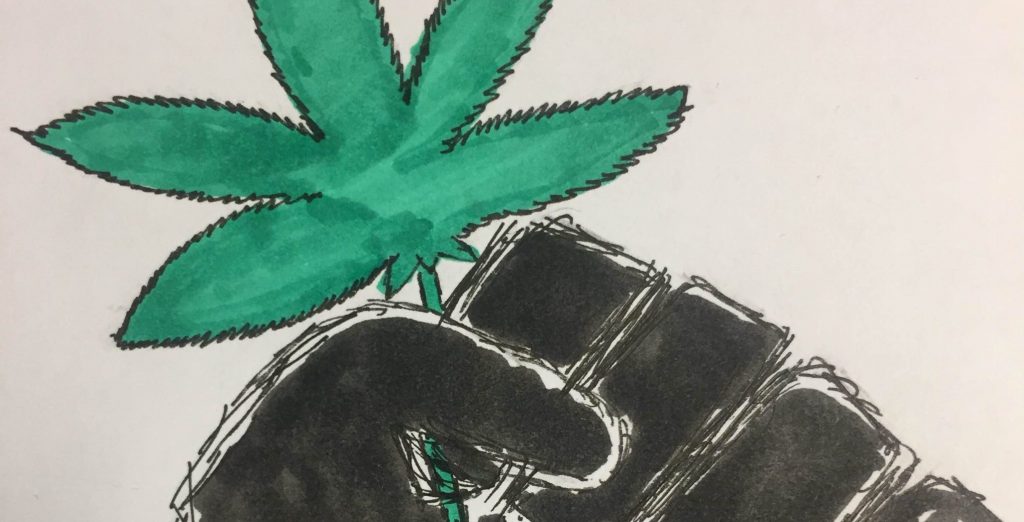Pot. Weed. Kush. It’s the drug you’ve all heard about. Having just been legalized and approved for medical and recreational usage in numerous states last month on Election Day (along with that Trump guy winning the presidency), marijuana has unarguably been one of the most hotly debated drugs in the 21st century. And for good reason; with the growing push towards pro-choice in all kinds of topics, it’s only expected for the most recreational un-recreational drug to be thrown into the conversation. But what got it in this spot in the first place? Why was marijuana outlawed, and should it even still be?
To answer the first question, American fear was why marijuana had been illegalized. In the early nineteenth century, as Mexicans became one of the largest immigrant groups to enter the US, they brought with them a plant called ‘marihuana’ – sounds familiar, huh? As the media began propagating fear about how the new immigrants were causing disturbances to American society, marihuana was then perceived, along with these foreigners, as a negative thing. But here’s the kicker; while the Mexicans were using this marihuana for medicinal purposes, Americans had cannabis present in nearly all of their medicines. Same plant, different name. “Wait a second,” you ask, “Doesn’t that mean if marihuana is outlawed, cannabis would have to be outlawed as well?” Good thinking, Einstein. That’s exactly what happened: as states began to ban the usage of marihuana, with it went cannabis. And soon enough, the Feds began putting national restrictions on the drug. First, the Marijuana Tax Act of 1937. And later, when that was ruled unconstitutional, the Controlled Substances Act; which, if you remember from freshman Health class, is how drugs became classified with Schedules. And the most restricting classification, Schedule I, is where poor old cannabis was placed.
“O.K. CJ, still, even though marijuana was illegalized because of being in the wrong place at the wrong time, studies nowadays still show that it can do some pretty bad stuff.” You’re right. According to New Health Advisor, cannabis smokers face the risks of memory impairment, addiction, and short-term general side effects. But it’s important to realize that all of these effects are present in numerous other everyday substances – alcohol, tobacco, and inhalants. It’s also important to note that marijuana is nontoxic – it can’t be overdosed on, meaning deaths directly related to marijuana are not possible, compared to the tens of thousands who die from alcohol poisoning every year. Now, I’ll admit that deaths attributable to the usage of drugs, such as car crashes while under the influence, are an entirely different beast and can’t be as easily quantified. However, according to Slate, “Real-world data from auto accidents indicate that a drunk driver is approximately 10 times more likely to cause a fatal accident than a stoned driver”. While we should all keep in mind that no matter what, driving sober and alert is the best way to go, marijuana has been proven to be far less detrimental to a person’s cognitive function compared to the effects of alcohol; which, just to clarify, is legal.
“You still haven’t proven any benefits of marijuana, CJ. What’s the point in legalizing a drug that just gives people paranoia and asthma?” Well, I beg to differ, reader. Marijuana doesn’t give its users asthma. It can actually help increase a lung’s ability to, well, breathe. According to Business Insider, “. . .a study published in Journal of the American Medical Association in January 2012 [shows that] marijuana does not impair lung function and can even increase lung capacity.” And aside from helping you run that 5k, marijuana also promotes creativity, prevents cancer, reduces nausea, decreases seizures, slows Alzheimer’s, eases sclerosis pain, treats bowel diseases, mitigates arthritis discomfort, establishes a healthier metabolic rate… the list is simply endless. And, when you realize that only 6 percent of studies on weed are designed to examine potential benefits, it’s obvious that there’s much more to learn.
Marijuana was originally outlawed because of a clashing of cultures, and that stigma has carried with it for over a century. Its negatives are just barely comparable to that of everyday, legalized substances. And when you look at the long list of positives, constantly being added to every month, the disparity becomes evident. It’s fair enough to say that marijuana is a drug with thousands latched on; a drug with effects that can change a person’s life forever. But in the case that that effect will cure the person of endless strokes; will encourage them to write a New York Times Best Seller; will save them from an identity crisis because they are no longer obese, it raises the question: who are we to prohibit giving marijuana to the people who would benefit most from it? We’ve already made tons of progress; if we keep moving forward, not even that Trump dude will be able to stop us.
CJ Lee
staff writer
Graphics: Justine Umali


I concur. Marijuana has been looked on as a danger for too long. There are just too many squares running this state/country to realize.